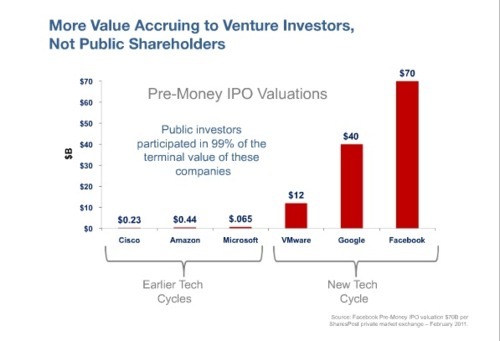Although there have been many huge venture capital returns in the past, one of the great little secrets in technology investing land has been that, for the best companies, more value is created post IPO, rather than pre IPO. As an example, an investment in Cisco at its 1990 IPO price or in Microsoft at its 1986 IPO price would be worth approximately 300x today, even at their currently depressed stock prices. The clear message here – if you pick the real winners, you can make more money investing at the IPO (or even afterward) versus investing when a company is private in one of the venture capital rounds. I like to call this, “Public Venture Capital.”
The recent rise of the private market secondary share exchanges has helped inspire rapid increases in valuations of the newest private company highfliers such as Facebook, Zynga, Groupon and Twitter. Shares in each of these companies are trading on private markets at prices that bestow valuations well into the multiple billions. What does this mean? Will this trend mark the end of Public Venture Capital opportunities?
A very interesting recent TechCrunch post by William Quigley of Clearstone Venture Partners, “The Next 10 Years Will Be Great For Both Founders and VCs,” argues that the rise in private company valuations will continue, ushering in the what Quigley calls the “real golden age” of venture capital. He also argues that great returns in Public Venture Capital are gone, and the only way to participate in great wealth creation in this and future tech cycles is to be a “founder, an early employee or a private investor.” In fact, Quigley believes that upwards of 50-75% of the terminal values of the best companies will be captured by the folks who did the real work – the founders, employees and private investors. Quigley’s chart helps summarize his argument.

While I agree with Quigley that more value is being created pre-IPO in companies like Facebook, I don’t think Public Venture Capital is dead. Quite the contrary. Great companies tend to create value at a rapid rate for a long period of time. Some great companies choose to go public earlier in this value creation curve, and some choose to go public later, such as Facebook. As proof, Apple has created over 3 times as much value as Facebook since Facebook was founded. True, Facebook’s growth has been phenomenal, but Apple’s growth has been no less awe inspiring, and public investors in Apple would no doubt argue that Public Venture Capital is alive and well.
Quigley argues that the next 10 years will be great for founders and VCs. I agree. But, I don’t believe this will be because great public returns will die in favor of value being captured when companies are private. For founders, employees and investors alike, the trick was, is and will always be to hold shares in great companies. Companies with great management teams that grow fast, operate in very large markets and have competitive advantages that enable the delivery of high margins. In these great companies, the reward of a high stock price is far more certain than the timing, whether captured privately, at IPO or long after an IPO is completed, of the gain.